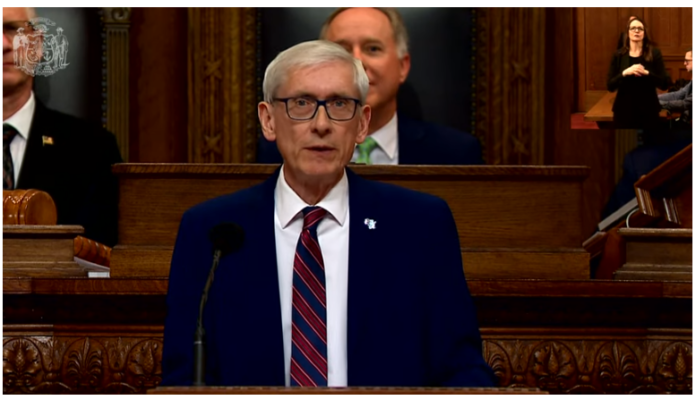Molly Beck | Milwaukee Journal Sentinel | USA TODAY NETWORK – WISCONSIN
The Democratic governor’s $104 billion, two-year budget would dramatically boost school spending, implement a paid family leave program, spend $290 million to keep the Milwaukee Brewers in Wisconsin, freeze enrollment in the state’s private school voucher programs, cut taxes for the middle-class by 10%, expand health-care coverage, legalize marijuana, expand broadband internet access and require lawmakers to adhere to the state’s public records retention laws, among other measures.
Republicans who control the Legislature plan to reject much of the budget and write their own plan, which will likely include much larger tax cuts, a smaller increase in funding for schools an expansion of private school vouchers and programs to help rural areas of the state.
Budget process timeline
Introduction: Budget is introduced
Evers in February introduced his spending plan for the two-year budget cycle that begins on July 1.
Hearings: Lawmakers hear from state agencies, advocacy groups
The Legislature’s Joint Committee on Finance will hold hearings with representatives from state agencies and advocacy groups on the proposed budget plan. Republican lawmakers control the committee 12-4.
Committee votes: Budget panel takes up proposals one by one
The committee is expected to take up the budget sometime this spring and will likely toss Evers’ proposals and tackle the budget piece by piece. During hours-long sessions over several weeks, it will vote on individual provisions of the budget.
Legislative approval
The committee is expected to finish its work in June. From there, its version of the budget will go to the floors of the Assembly and Senate, which can make further adjustments to it. Once the two houses agree on a budget, they will send it to Evers.
Line-item vetoes: Governor can rework Legislature’s work
Evers can rework what the Legislature gives him using some of the broadest line-item veto powers in the country. Evers can remove words and sentences from the budget to come up with a new plan. Historically, the Wisconsin Supreme Court has deferred to governors on vetoes, but in 2020 the high court threw out some of his vetoes from the 2019 budget. That ruling did not provide clear guidance on how far the governor can go when vetoing future budgets.
Budget signed
Tony Evers eventually signs the Republican-written state budget. In the last two-year budget cycle, Evers’ signature came on July 19, 2021.
Key issues to watch
A lineup of the major issues is on the table for the 2023-25 state budget. In the coming weeks, legislators will propose their own solutions to these issues and change a lot of what has been proposed by Gov. Tony Evers.
Schools: Evers seeks a record increase
Evers recommended increasing school funding by $2.6 billion over two years, which would them the largest boost they have ever received. Republicans have signaled they won’t accept an increase anywhere near that large but haven’t spelled out how much they want to spend on schools.
Milwaukee Brewers: 9-figure sum to shore up Brewers stadium
Evers wants to put $290 million in cash in an escrow account operated by the Southeast Wisconsin Professional Baseball Park District, a state-created agency that owns American Family Field, for long-term improvements the Milwaukee Brewers say are needed at the stadium. In return, the Brewers would extend their current ballpark lease, which could expire by the end of 2030, and agree to stay in Milwaukee through 2043.
Assembly Speaker Robin Vos, R-Rochester, has called Evers’ proposal likely ‘dead’ with Republican lawmakers but said he supports crafting a new plan. He has criticized the governor for not bringing him into his negotiations.
Paid family leave: Evers seeks 12 weeks paid
Evers wants to ensure public and private sector workers get 12 weeks of paid family and medical leave benefits by Jan. 1, 2025. One-time state funding of $243 million would jump-start the program. Employees and employers would contribute money into a state-run trust fund administered by the Department of Workforce Development and paid out when employees need to take the leave.
Republican lawmakers have signaled they won’t support the requirement.
University of Wisconsin System: A $305 million boost
Evers wants to provide the system with a funding increase of $305 million. Republicans are unlikely to go along with an increase as large as what Evers is seeking.
Taxes: A flat rate vs. targeted relief
Evers wants to raise some taxes and reduce others. In all, his budget would essentially leave the state’s tax burden flat if all measures were adopted together. The tax increases are aimed at businesses and the wealthy and the tax cuts are aimed at the middle class.
Under his plan, large manufacturers that don’t pay income taxes would now have to pay them (smaller operations would continue to avoid income taxes). Republicans have said they won’t raise taxes and are looking to cut taxes or implement a flat income tax of 3.25% but have not released an agreed-upon proposal. Republican leaders of the budget-writing committee said a flat tax likely won’t make it into a final budget proposal and called the idea a long-term goal.
Guns: Another call for background checks
Evers’ budget would change state law to require background checks for all gun purchases. In addition, it would establish a so-called red-flag law that would allow law enforcement officials and judges to temporarily take guns away from those deemed to be dangerous. Republicans have rejected those ideas previously.
BadgerCare Plus: Expansion would reel in $1.6 billion
Evers is urging Republicans to expand the BadgerCare Plus health insurance program under the Affordable Care Act, which is also known as Obamacare. That would put about 90,000 more Wisconsinites on BadgerCare while saving the state $1.6 billion over two years because of the way Obamacare is structured. Republicans have said they won’t take the deal because they consider Obamacare a form of welfare that will hurt the private health-care market.
Marijuana legalization: No agreement likely
Evers recommended legalizing medical and recreational marijuana and using some of the taxes from it for rural schools. Republican leaders have signaled they could agree to create a medical marijuana plan but potentially not this year.
Minimum wage: Evers seeks gradual rise
Evers wants to immediately raise the minimum wage of $7.25 an hour to $8.60. It would go up to $10.15 by 2024 and increase by the rate of inflation annually after that. Republicans have opposed raising the minimum wage.
Act 10: Taking aim at Scott Walker’s signatuure law
Evers proposed dropping Act 10, the 2011 law that all but eliminated collective bargaining for most public workers in Wisconsin. Republicans have said they will keep Act 10, viewed as the signature policy achievement of the era of Gov. Scott Walker.


